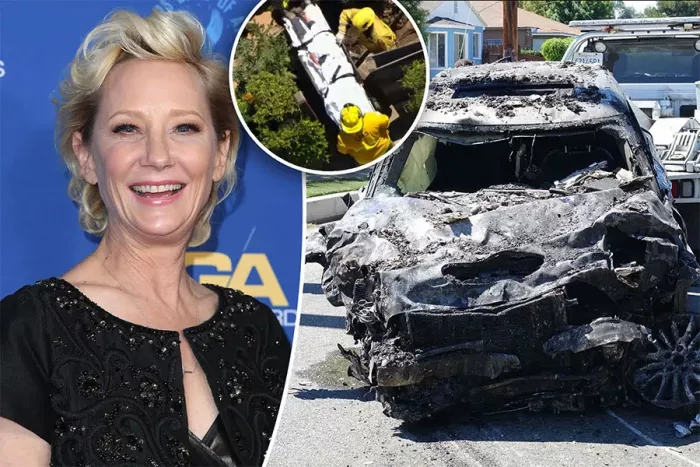
Anne Heche, once hailed for her fearless roles in Donnie Brasco, Six Days, Seven Nights, and Another World, led a career marked by bold choices and personal struggles. Known for her raw talent and unfiltered honesty, Heche also made headlines for her openness about mental health and her high-profile relationship with Ellen DeGeneres in the late 1990s a time when few in Hollywood were openly queer.

But on August 5, 2022, Heche’s story took a tragic turn. She crashed her Mini Cooper into a Los Angeles home at high speed, igniting a fire that destroyed the residence. Critically injured, she was declared brain-dead a week later. Toxicology reports revealed the presence of cocaine and fentanyl, though no alcohol.
Rescue efforts stalled for 45 minutes. Fire department radio logs released later revealed that firefighters could not access the car for at least 20 minutes, and then spent another 20-plus minutes towing it out of the burning building. During that period, Heche lay severely injured on the passenger-side floorboard.
She sustained smoke inhalation, extensive thermal burns, a fractured sternum, and severe anoxic brain injury. Declared brain‑dead on 11 August at the Grossman Burn Center, she ultimately died, having never regained consciousness. Her cause of death was officially ruled an accident.
The tenant of the destroyed home, Lynne Mishele, escaped unharmed but lost virtually all her possessions and her rental. In November, she sued Heche’s estate for more than $2 million, citing emotional trauma, displacement, and loss of personal and business items. While no criminal charges were filed due to her death, the civil aftermath continued. Lynne Mishele filed a lawsuit for emotional trauma and property damage. Legal experts pointed to a larger issue: Heche’s estate, valued under $400,000, offered little relief for victims. Her sons also entered a probate dispute, deepening the legal complexity.
Heche’s death not only left behind a complicated legacy but also raised unresolved questions about accountability, addiction, and victim rights, reminding the public that even in the spotlight, pain often runs deep beneath the surface.




Comments